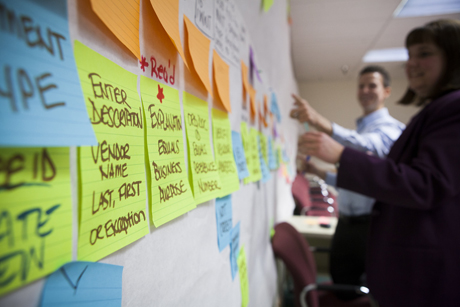'Lean' approach lightens staff members' workload
By Nancy Doolittle

In just one year, a new process improvement approach has increased staff morale, improved communication and saved the university $500,000.
The “lean” approach, described by James P. Womack and Daniel T. Jones in “Lean Thinking,” teaches staff to identify and eliminate unnecessary work, material waste and unproductive activity in their day-to-day processes.
The lean approach was first used in the College of Veterinary Medicine in January 2013 to improve its salary recovery process. Since then, six more Vet College teams and 25 teams in the College of Agriculture and Life Sciences and the Divisions of Alumni Affairs and Development; Financial Affairs; Human Resources and Safety Services; and Student and Academic Services have made lean process improvements.
“We became interested in lean thinking when we were asked to address employee concerns about work overload that had surfaced through the 2011 Employee Survey,” said Kathryn Burkgren, director of organizational development for faculty and staff (ODFS). “We decided it would be a good fit for Cornell because it improves simple and complex processes for the staff who are doing the work,” she said.
Once a college or unit engages ODFS to work on a lean project, it forms a team to map the process needing improvement, identify “pain points,” determine changes to improve the current process, and map out an ideal state. Some improvements come from “just-do-its,” quickly implemented recommendations; others take time or an investment in technology; still others need buy-in at the college, division or university level.
Burkgren noted that lean results address three other concerns highlighted by the survey: the need for career opportunities and growth, giving feedback to supervisors and staff recognition. ODFS consultant Jess Cisco said, “The lean approach also helps people feel positive and in control of their work and builds community and relationships.”
In the Vet College’s Animal Health Diagnostic Center (AHDC), the receiving department set up several teams as a result of their lean evaluation. The center receives hundreds of boxes containing samples daily from veterinarians across the United States and around the world that must be opened and sorted for testing. Program aide Danielle Maguire noted that the center has saved time and more than a case of paper each week by eliminating paperwork and changing the sample pick-up process.
Communication within the AHDC has improved, said medical technologist Jennifer Powers, while Korana Stipetic, extension associate from Population Medicine and Diagnostic Sciences (PMDS), pointed to improved communications with clients submitting samples and an improved workplace climate.
Kim Ramm, director of business operations for PMDS/AHDC, said that AHDC staff responsibilities have shifted. “By eliminating unnecessary steps, we have given staff time to do work that is more important and that can further their career development.”
Similarly, The Cornell Store has changed its online processes. Until recently, the store fulfilled online orders on-site, taking inventory from its shelves in various locations that changed frequently. With the growth of its online business, in-store staff found they spent hours every day on this process instead of serving in-store customers.
“Through the lean approach, we moved the online order fulfillment business directly to the warehouse, where locations are fixed and therefore much more efficient. We were able to repurpose that space to the Postmarket, where we have realized $204,000 in Postmarket sales without adding new staff,” said Pat Wynn, director of The Cornell Store.
David Pinker, senior director for advancement services in the Division of Alumni Affairs and Development, said the lean approach changed the culture of the Advancement Services unit. “Before lean, goal development, communication and decision-making happened ‘tops-down,’” he said. Now staff and managers “work on shared goals and have daily communications with immediate feedback.” Pinker said staff confidence, motivation and teamwork have increased.
Some improvements become broadly applied. The Business Service Center in the College of Agriculture and Life Sciences and the College of Human Ecology changed procurement card processes to minimize duplicative efforts; automated email notifications by P-card coordinators; and implemented SharePoint to manage documents. The process has been adopted universitywide, said Sherry Thompson, finance specialist in the College of Human Ecology.
For their part, Burkgren and Cisco find satisfaction in helping departments and units improve processes and increase the value of their staff’s work. “We’re passionate about helping them make their worklife better,” Cisco said.
Media Contact
Get Cornell news delivered right to your inbox.
Subscribe